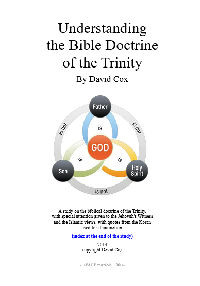The Jehovah’s Witnesses turn the phrase, “Son of God” to mean someone who is inferior to, and after (created) the Father. This is not valid in the light of the teaching of Scripture. Some people wish to make this a minor issue of no importance. 1 John 4:15 it says, “Whosoever shall confess that Jesus is the Son of God, God dwelleth in him and he in God”. In other words, our confession of Jesus as our Savior which opens salvation to us is specifically a confession of the man Jesus to be the Deity, the Son of God. In Peter’s interchange with Christ, he says…
Mat 16:16 And Simon Peter answered and said, Thou art the Christ, the Son of the living God.
Mat 16:17 And Jesus answered and said unto him, Blessed art thou, Simon Barjona: for flesh and blood hath not revealed it unto thee, but my Father which is in heaven.
Mat 16:18 And I say also unto thee, That thou art Peter, and upon this rock I will build my church; and the gates of hell shall not prevail against it.
Christ asserts that Peter’s confession of Jesus as the “Son of God” is the foundation of the Church.
If this confession of Jesus as the “Son of God” is so importance as to hinge salvation upon it, then we have understand and place proper importance on the true meaning of this phrase, “the Son of God.”
What does the phrase “son of something” mean?
The phrase “Son of God” occurs in 46 verses in the New Testament (plus an adjective before God in Mark 5:7; John 6:69), and only in Dan 3:25 in the OT.
Consider these phrases:
Num 23:19 “God is not a man, that he should lie; neither the son of man that he should repent”
1Sam 20:30 “thou son of the perverse rebellious woman”.
1Sam 25:17 “for he is such a son of Belial, that a man cannot speak to him”
Eccl 10.17 “Blessed art thou, O land, when thy king is the son of nobles”
Jer 49:18 “Sodom and Gommorrah… no man shall abide there, neither shall a son of man dwell in it”
Eze 2:1 “he said unto me, Son of man”
This small selection of OT verses where “son of somebody or something” is used shows us that the person who is the son has the character or essence of the father.
The phrase “son of something” is commonly used in the Bible to indicate that a person has the character and essence of someone or something else. If this is a person, for example King David, then the “son of David” means that the person is in the blood line of David, one of his sons. The idea being is that a son has the same character, quality, and essence of his father. When the Bible uses the phrase “son of God” it means that the person (Jesus) has the essence and being of the Father. What the Father is (God), so is His Son (God).
“Besides, it is forgotten, when such language (Son of Man, Son of God) is used, that in biblical phrase the name Son of God supposes nothing which Gen 6:2, Job 1:6; 2.1; Ps 82:6; Hos 1:10; Mat 5:9; Luke 6:35; 20:36; Gal 3:26
We will now consider other scriptures that support this truth. Here it is necessary to find scriptures where the abstract concept of sonship is the subject matter. It is not sufficient to look at places where the name “Son of God” is mentioned because, as we have seen, it is common to identify a person by a name or title even when referring to occasions when the person did not possess that designation. All the scriptures which say that the Father sent the Son do not prove to those who hold the temporal sonship theory that the Lord was the Son before He was sent, because, they say, the Divine Persons were not known by any distinct names before the incarnation, and therefore can only be referred to by the names they took afterwards.
Hebrews 5: 8. “Though He were Son”. There is no definite article before Son; it is characteristic, and the relationship of Sonship is the prominent thought. “Though He were Son, yet learned He obedience”. As the Son, the experience of obedience was unknown to Him, and so He learned what that experience was by the things that He suffered. In this passage we see that the idea of obedience and subjection was foreign to His Sonship. This is the opposite to the doctrine of temporal sonship which maintains that His Sonship is to be identified with subjection. No, it is not as the Son that He learned obedience, but in spite of His being such. The reason a man is subject and inferior to his father in human relationships is that the son is always the junior, the father obviously being born first. To argue from this that the Lord’s Sonship denotes subjection is plainly wrong for there can be no seniority between Divine Persons. It is another example of trying to understand the Infinite by a comparison with the finite.
Now turn to John 1: 14. The literal translation is “We beheld His glory, the glory of an only begotten with a father”. The glory is that of the abstract relationship rather than that of the Person Himself, that is to say, the glory in this passage is specifically that of His Sonship. This glory shone through the veil of His flesh so that His disciples recognised it. It was His Divine glory.
This will be immediately challenged by those who deny His eternal Sonship. They will say that it is His moral glory, which He had as the Perfect Man. We will, therefore, test this by searching the Scriptures. When those who had to do with Him in His life here were constrained to confess Him as the Son of God, what made them do so? Was it His moral glory or His Divine glory? Let us look at the incidents involved.
(1) Nathanael (John 1: 49) confessed Him as the Son of God and King of Israel. It was His omniscience that opened His eyes. The Lord had shown that He knew some secret that only Nathaniel could have known.
(2) The disciples in the boat. (Matthew 14: 33). The Lord had just shown His Divine power as the Creator and Sustainer of all things, walking. on the water and stilling the wind and the waves. Here we have Him as the omnipotent One.
(3) Martha (John 11: 27). The Lord had just revealed Himself as the Source of Life. Only God is the Source of Life. All other beings receive their life through Him.
(4) The man blind from birth (John 9: 35-38). Here the man is told directly from the Lord Who He is. It is the man’s reaction that is noteworthy as he immediately worships the Son of God showing that he recognised His Deity; for the Lord accepted his worship as offered intelligently. We can contrast this with the man in Matthew 19: 16-17 who said “Good Master”. At once the Lord checked him, because he had ascribed something to Him that only applied to God, without realising that the One he was speaking to was indeed God.
(5) The Centurion (Matthew 27: 54; Mark 15: 39). Here the reasons for the centurion’s confession are plainly stated. In Matthew it was due to the severe earthquake, the rending of the rocks and the opening of the tombs. In Mark it is specifically stated that it was due to the Lord’s shouting with a loud voice just before He gave up His spirit. This was remarkable to the centurion who had no doubt seen large numbers of such executions. A man crucified gets weaker and weaker until he cannot speak above a whisper. Here was One who could shout with a loud voice just before He died, showing supernatural strength. It was, therefore, not His moral glory that convinced the centurion, but His Divine glory, as was the case in all the foregoing cases.
We will refer to Peter’s great confession in Matthew 16: 16 and John 6: 69 later.
We are therefore fully justified in asserting that the Lord’s Sonship denotes His Deity and does not pertain to His lowly dependence and obedience as the Perfect Man. A possible reason why some think that the glory of John 1: 14 is moral and not Divine, is the words that immediately follow: “full of grace and truth”. We are sure, however, that the Authorised Version is correct in putting the clause “and we beheld His glory, the glory of the Only Begotten of the Father” in brackets. The words “full of grace and truth” refer to the statement before the parenthesis: “the Word was made flesh and dwelt among us”. The parenthesis is put in to show that in spite of the veil of flesh, the Divine glory shone through for His own to see. In saying all this we are not wishing to infer that moral glory is not included in Divine glory for “God is Light”. The idea that we are opposing is that it was exclusively His moral glory as seen in manhood. Dronsfield, W.R. – Eternal Son of the Father, Chapter 2
The phrase “Son of God” is exclusively used of Jesus as God
Sons [ben H1121] of God
“Sons of God” = Spirit celestial beings? – Gen 6:4 (Note see Luke 20:36 for a possible clarification)
Children [G5207 huios] of God
Mat 5:9 “peacemakers” in beattitudes; [G3700 huios]
Luke 20:36 those participating in the resurrection “neither can they die any more: for they are equal to the angels; and are the children [G5207 huios] of God, being the children of the resurrection”
Gal 3:26 For ye are all the children of God by faith in Christ Jesus.
Children [G5043 teknon] of God
John 11:52 And not for that nation only, but that also he should gather together in one the children of God that were scattered abroad.
Rom 8:16 The Spirit itself beareth witness with our spirit, that we are the children of God:
Rom 8:21 Because the creature itself also shall be delivered from the bondage of corruption into the glorious liberty of the children of God.
Rom 9:8 That is, They which are the children of the flesh, these are not the children of God: but the children of the promise are counted for the seed.
1Jn 3:10 In this the children of God are manifest, and the children of the devil: whosoever doeth not righteousness is not of God, neither he that loveth not his brother.
1Jn 5:2 By this we know that we love the children of God, when we love God, and keep his commandments.
Use of the Phrase “Son of God”
“Son of God” is used 48 times in 47 verses (Dan. 3:25; Matt. 4:3, 6; 8:29; 14:33; 26:63; 27:40, 43, 54; Mk. 1:1; 3:11; 15:39; Lk. 1:35; 3:38; 4:3, 9, 41; 8:28;22:70; Jn. 1:34, 49; 3:18; 5:25; 9:35; 10:36; 11:4, 27; 19:7; 20:31; Acts 8:37; 9:20; Rom. 1:4; 2 Co. 1:19; Gal. 2:20; Eph. 4:13; Heb. 4:14; 6:6; 7:3; 10:29; 1 Jn. 3:8; 4:15; 5:5, 10, 12f, 20; Rev. 2:18).
Mat 8:29 the demons “what have we to do with thee, Jesus, thou son of God? art thou come hither to torment us before the time?” (Judgment)
Mat 14:33 “came and worshipped him, saying, Of a truth thou art the Son of God” (Worship)
Mat 16:16 “Thou art the Christ, the Son of the living God” (Being Christ)
Mat 26:63 “I adjure thee by the living God, that thou tell us whether thou be the Christ, the Son of God.” (Deity)
Mat 27:40 “If thou be the Son of God, come down from the cross” (God Power)
Mat 27:43 “He trusted in God; let him deliver him now… for he said, I am the Son of God” (Special relationship with God)
Luke 1.35 “that holy thing which shall be born of thee shall be called the Son of God” (divinity)
John 1:34 “I bare record that this is the Son of God” (Something noteworthy)
John 1:49 “Rabbi thou art the Son of God; thou art the King of Israel” (Ruler of God’s people)
John 3:18 “condemned already, because he hath not believed in the name of the only begotten Son of God.” (Perdition for not believing Jesus is Son of God)
John 5:25 “the dead shall hear the voice of the Son of God; and they that hear shall live” (power to resurrect the dead)
John 10:36 “Thou blasphemest; because I said, I am the Son of God?” (Deity)
John 19:7 “by our law he ought to die, because he made himself the Son of God” (Deity)
John 20:31 “that ye might believe that Jesus is the Christ, the Son of God; and that believing ye might have life through his name” (Salvation)
Acts 8:37 “If thou believest… I believe that Jesus Christ is the Son of God.” (Salvation)
Heb 4:14 “a great high priest… Jesus the Son of God” (Heavenly Intercession and Priesthood)
1John 5:12 “He that hath the Son hath life; and he that hath not the Son of God hath not life” (Salvation or Eternal Perdition)
Conclusion
Even though the phrase “sons of God” (huios) is used in the New Testament, it would seem to refer to those who are born again Christians. But the phrase “Son of God” has a very different connotation because it is clearly used as though the understanding is deity, the Messiah.
John 5:18 Therefore the Jews sought the more to kill him, because he not only had broken the sabbath, but said also that God was his Father, making himself equal with God.
John 5:19 Then answered Jesus and said unto them, Verily, verily, I say unto you, The Son can do nothing of himself, but what he seeth the Father do: for what things soever he doeth, these also doeth the Son likewise.
John 5:20 For the Father loveth the Son, and sheweth him all things that himself doeth: and he will shew him greater works than these, that ye may marvel.
John 5:21 For as the Father raiseth up the dead, and quickeneth them; even so the Son quickeneth whom he will.
John 5:22 For the Father judgeth no man, but hath committed all judgment unto the Son:
John 5:23 That all men should honour the Son, even as they honour the Father. He that honoureth not the Son honoureth not the Father which hath sent him.
John 5:24 Verily, verily, I say unto you, He that heareth my word, and believeth on him that sent me, hath everlasting life, and shall not come into condemnation; but is passed from death unto life.
John 5:25 Verily, verily, I say unto you, The hour is coming, and now is, when the dead shall hear the voice of the Son of God: and they that hear shall live.
The point here is that Jesus clearly used the concept that he is the Son of God. At the end he actually uses this phrase to describe himself. The Jews understood this teaching as making Jesus to be God, fully equal with God, Deity. When the Jews use the phrase “son of”, it did not generally mean subordination but rather equality with and identity with the nature of somebody. When the Jews understood his teaching as being equal to God, Jesus did not deny this conclusion and correct their teaching, but rather he defends it. This is situation is again repeated in John 10:30-39.
Jesus’ Sonship means inherit power, right, and authority
It is very important to see that the Scriptures does not use the concept “Son of God” in Hebrew basically, but does use it in Greek. In Greek we have several words for a child. Brephos is a child that is still in the womb, or recently having been born. The focus is on the child’s relationship and closeness to his birth. Paul refers to Timothy’s learning of Scriptures from his childhood 2 Tim 3:14-15 and uses this word here. Another Greek word for child is nepios which is generally used for children at or around age two. The word means without speech, but making noise, and is the word for our English “toddlers”. Paul uses this concept in Eph 4:14when Paul exhorts them NOT TO BE THESE KIND OF CHILDREN. Toddlers are known for being unstable and falling down frequently, and they frequently talk a lot and say nothing, and they don’t really know what they are doing. The word technon is a general word for child between brephos and nepios, and refers to a small child.
The phrase “son of God” is always a different Greek word, huios. This concept does not mean you are a minor child of somebody. It means you are the one who receives the inheritance and control over all that the father has. It means heir of everything. In Bible times, they were not very equable by our ideas today. Instead of a father splitting his goods equally between his children, one child got it all. That child took over the ranch, farm, business, of the father, and continued it essentially taking the father’s place. That child had to continue to take care of his mother, as well as all of his brothers and unmarried and widow sisters. The sisters of this chosen child were to be taken care of much as he would care for his mother. They were not slaves, nor queens (not working). The brothers were people of importance in the business of the family, managing, and administrating things. Rom 8:17 indicates that the saved will be joint heirs with Christ, but our position with Christ is not going to be exactly equal with Christ. We will be in the administration of Christ, ruling with him, but we are never given equality with Christ.
More from this Category
32.03.07.02D Christ’s unique relationship with God the Father
Top | 00 | 01 | 02 | 03 | 04 | 05 [01 | 02 | 03 | 04 | 05 | 06] | 06 | 07 | 08 | 09 | 10
John 1:18 “No man has seen God at any time; the only begotten God who is in the bosom of the Father, He was explained Him” .
Torrey, RA – What the Bible Teaches#Subordination of the Son to the Father
Flavel – The Covenant of Redemption between the Father and the Redeemer (s)
Flavel – The amazing love of God in giving his own Son for us (s)




 Helpful Windows User Tip for "Searching Everything" on your PC.
Helpful Windows User Tip for "Searching Everything" on your PC.
